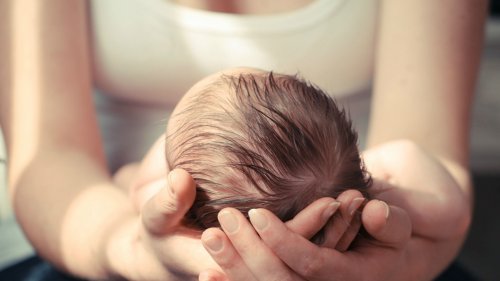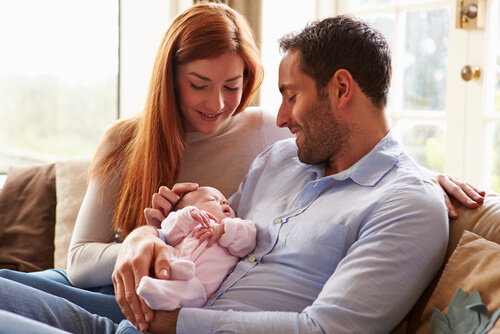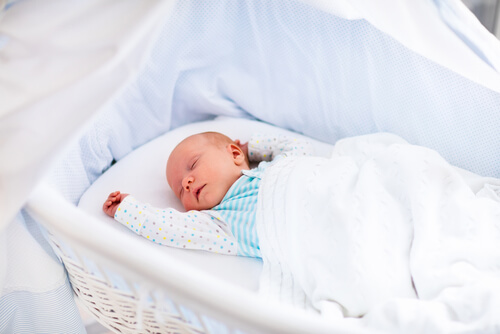Your Baby's First Month: Everything You Should Know

During your baby’s first month of life, you’ll notice they spend a lot of time sleeping, waking up regularly to feed. They may have the hiccups, and sneeze frequently.
In this article, we’ll look at these and other characteristics of your baby’s first month of development.
There are hundreds of questions that can arise about raising a newborn. How to feed your baby, when you should bathe them, what happens to their umbilical cord and how to care for it…
If you’re a first-time mom, you’re sure to have even more.
But don’t worry: there are many things that babies do during this stage that might look alarming at first sight, but that are in fact very common.
The important thing is to keep a watchful eye on your baby, give them the care and attention they need, and, if necessary, speak to a specialist about anything unusual you notice.
The characteristics of a baby’s first month
This is what your baby’s behavior will look like during their first 30 days of life:
- Your baby will sleep for 14–16 hours a day. They’ll wake up for short periods at a time, between 7–12 times a day, generally to feed.
- At first, they won’t be able to see. As time goes on, their eyes will begin to focus little by little.
- Your baby may lose a little weight, even if you breastfeed whenever they want. This is normal in newborns.
- Newborns often have hiccups and sneeze frequently. This doesn’t mean they have digestive or respiratory problems.
- They should defecate 4 or 5 times a day and urinate 2 or 3 times. At this age, their stool will be yellow or greenish and very liquid.
- Their breathing may be loud and irregular, particularly when they’re sleeping. This is nothing out of the ordinary.

How your baby changes during their first month
You may notice that some of your baby’s functions will take time to “activate” little by little.
As time passes, babies gain the ability to distinguish between familiar faces and even to smile when they see them. They’ll be drawn to colors, lights and sounds.
In terms of their emotional development, it’s fundamental that the baby feels protected and loved.
Whatever some theories may say, there is absolutely nothing wrong with holding your baby in your arms. Constant company and being held will calm them down and help them feel secure.
Building a bond of affection during the first month of life is key. Newborns are able to recognize their mother by smell alone. They cry instinctively, in order to get their mother’s attention and have their needs met.
This bond isn’t just with the baby’s mother, however. Their father, too, can participate actively from the very beginning.
The only limitation to what dads can do is when it comes to breastfeeding. But in all other ways, the baby’s father can and should play a central role in their care.
What to keep in mind in your baby’s first month of life
We should always be aware that a very young baby is an extremely delicate thing. They have only just come into the world, and are still in the process of adapting to it.
Be careful about the microbes from the outside world that your baby may come into contact with. Your baby’s bedroom should be well lit, warm and free of any kind of contamination.
It’s also important to keep visits to a minimum during this period. If people drop by, try to limit the visit to no more than 20 minutes. Any longer and they could be invasive for the baby; newborns are easily frightened.

In terms of hygiene, there are three key things that you should know:
- It’s best to bathe your baby daily with lukewarm water, in a warm room. Be very careful not to get water in their eyes and ears.
- Their umbilical cord will fall off on its own after around 6–15 days. A daily bath is enough to keep the area clean, but some doctors also recommend using a little alcohol to sanitize it.
- Their nails will begin to grow, and your baby could end up scratching their skin. Cut them whenever necessary.
“We should always be aware that a very young baby is an extremely delicate thing”
In terms of nutrition during your baby’s first month of life, nothing is better than breast milk. Whenever possible, breastfeeding is recommended until the baby is six months old.
All cited sources were thoroughly reviewed by our team to ensure their quality, reliability, currency, and validity. The bibliography of this article was considered reliable and of academic or scientific accuracy.
- Sabater, V. (2019, 30 mayo). El papá que cuida al bebé no “ayuda”, ejerce la paternidad. Recuperado de https://lamenteesmaravillosa.com/papa-cuida-al-bebe-ejerce-paternidad/
- Sabater, V. (2020, 6 marzo). La importancia de las caricias en nuestras relaciones afectivas. Recuperado de https://mejorconsalud.as.com/la-importancia-de-las-caricias-en-nuestras-relaciones-afectivas/